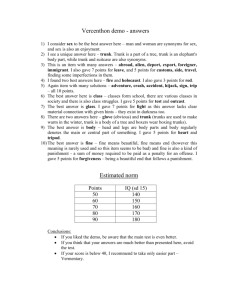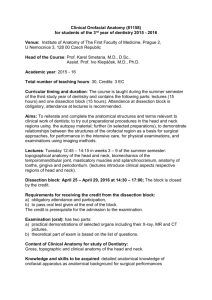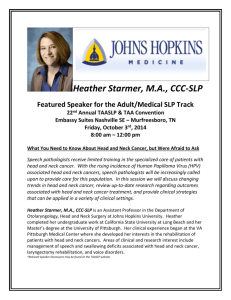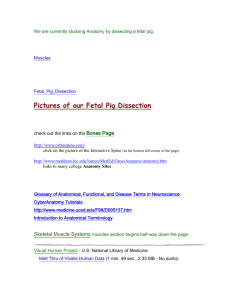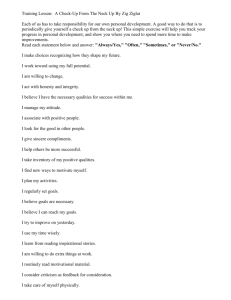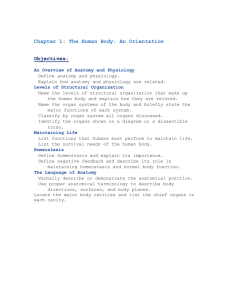as PDF - Unit Guide
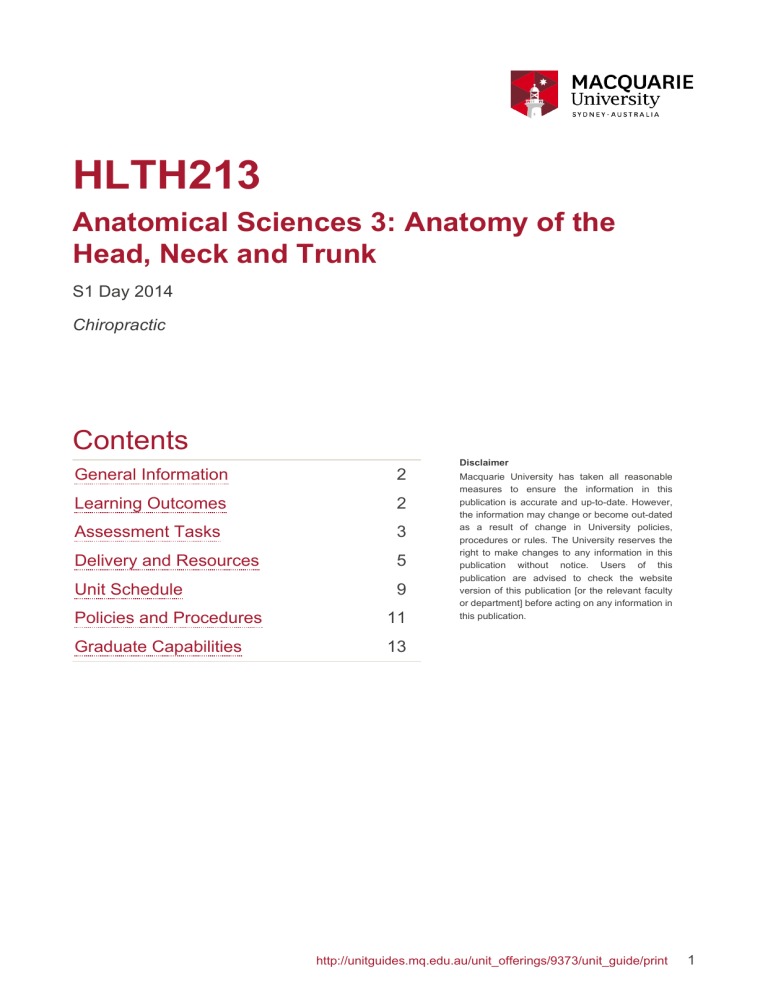
HLTH213
Anatomical Sciences 3: Anatomy of the
Head, Neck and Trunk
S1 Day 2014
Chiropractic
Contents
General Information
Learning Outcomes
Assessment Tasks
Delivery and Resources
Unit Schedule
Policies and Procedures
Graduate Capabilities
Disclaimer
Macquarie University has taken all reasonable measures to ensure the information in this publication is accurate and up-to-date. However, the information may change or become out-dated as a result of change in University policies, procedures or rules. The University reserves the right to make changes to any information in this publication without notice.
Users of this publication are advised to check the website version of this publication [or the relevant faculty or department] before acting on any information in this publication.
http://unitguides.mq.edu.au/unit_offerings/9373/unit_guide/print 1
Unit guide HLTH213 Anatomical Sciences 3: Anatomy of the Head, Neck and Trunk
General Information
Unit convenor and teaching staff
Unit Convenor
Goran Strkalj goran.strkalj@mq.edu.au
Contact via goran.strkalj@mq.edu.au
Credit points
3
Prerequisites
HLTH108(P)
Corequisites
Co-badged status
Unit description
This unit builds on the basic anatomy taught in HLTH108. The regional anatomy of the head, neck and trunk is examined in detail. The unit utilises an integrated approach within which relevant gross anatomy, histology and embryology, as well as clinical and applied anatomy are incorporated.
Learning Outcomes
1. Demonstrate a comprehensive understanding of the anatomy of the head, neck and trunk including the structure and function of the bones, joints, muscle, venous and lymphatic drainage as well as nerve and bloody supply of these structures.
2. Demonstrate an understanding of the embryology and age-related changes which occur in the structure and function of the head, neck and trunk.
3. Demonstrate an ability to use basic anatomical knowledge of the head, neck and trunk as well as critical thinking and research skills to thoroughly evaluate theoretical clinical case studies.
4. Demonstrate an ability to assess, interpret and explain radiographic, MRI and CT images of the head, neck and trunk using appropriate anatomical terminology.
5. Demonstrate an appreciation for and respect of people who choose to bequeath their body for research or teaching purposes.
http://unitguides.mq.edu.au/unit_offerings/9373/unit_guide/print 2
Unit guide HLTH213 Anatomical Sciences 3: Anatomy of the Head, Neck and Trunk
Assessment Tasks
Name
Weighting
20%
20%
20%
40%
0%
Due
Week 6
Wednesday April 30th, Week 7
Wednesday 11th June, Week 13 exam period none
Assignment
Due: Week 6
Weighting: 20%
Assignment topics will be given during the first lecture. The assignment will be a brief literature review related to selected topics in anatomy. It is to be written in a journal article format. Late submission will penalised at 10% per day or part thereof.
This Assessment Task relates to the following Learning Outcomes:
• Demonstrate a comprehensive understanding of the anatomy of the head, neck and trunk including the structure and function of the bones, joints, muscle, venous and lymphatic drainage as well as nerve and bloody supply of these structures.
• Demonstrate an understanding of the embryology and age-related changes which occur in the structure and function of the head, neck and trunk.
• Demonstrate an ability to use basic anatomical knowledge of the head, neck and trunk as well as critical thinking and research skills to thoroughly evaluate theoretical clinical case studies.
• Demonstrate an ability to assess, interpret and explain radiographic, MRI and CT images of the head, neck and trunk using appropriate anatomical terminology.
• Demonstrate an appreciation for and respect of people who choose to bequeath their body for research or teaching purposes.
Practical Test 1
Due: Wednesday April 30th, Week 7
Weighting: 20% http://unitguides.mq.edu.au/unit_offerings/9373/unit_guide/print 3
Unit guide HLTH213 Anatomical Sciences 3: Anatomy of the Head, Neck and Trunk
All identification activities conducted during the practical classes are examinable. These activities include identifying structures on images, bones, models, prosections, radiographs, CT and MRI images. There will be 14 stations, each with three identifications (questions). You will be allowed 1.5 minutes per station. Students are rotated through the 14 stations with one student per station.
This Assessment Task relates to the following Learning Outcomes:
• Demonstrate a comprehensive understanding of the anatomy of the head, neck and trunk including the structure and function of the bones, joints, muscle, venous and lymphatic drainage as well as nerve and bloody supply of these structures.
• Demonstrate an understanding of the embryology and age-related changes which occur in the structure and function of the head, neck and trunk.
• Demonstrate an ability to assess, interpret and explain radiographic, MRI and CT images of the head, neck and trunk using appropriate anatomical terminology.
• Demonstrate an appreciation for and respect of people who choose to bequeath their body for research or teaching purposes.
Practical Test 2
Due: Wednesday 11th June, Week 13
Weighting: 20%
See description for practical test 1.
This Assessment Task relates to the following Learning Outcomes:
• Demonstrate a comprehensive understanding of the anatomy of the head, neck and trunk including the structure and function of the bones, joints, muscle, venous and lymphatic drainage as well as nerve and bloody supply of these structures.
• Demonstrate an understanding of the embryology and age-related changes which occur in the structure and function of the head, neck and trunk.
• Demonstrate an ability to assess, interpret and explain radiographic, MRI and CT images of the head, neck and trunk using appropriate anatomical terminology.
• Demonstrate an appreciation for and respect of people who choose to bequeath their body for research or teaching purposes.
Final Examination
Due: exam period
Weighting: 40% http://unitguides.mq.edu.au/unit_offerings/9373/unit_guide/print 4
Unit guide HLTH213 Anatomical Sciences 3: Anatomy of the Head, Neck and Trunk
The final examination will cover content from the entire semester. It will test knowledge and comprehension of theory. Questions will include multiple choice questions, true or false questions, annotated diagrams and short answer questions.
This Assessment Task relates to the following Learning Outcomes:
• Demonstrate a comprehensive understanding of the anatomy of the head, neck and trunk including the structure and function of the bones, joints, muscle, venous and lymphatic drainage as well as nerve and bloody supply of these structures.
• Demonstrate an understanding of the embryology and age-related changes which occur in the structure and function of the head, neck and trunk.
• Demonstrate an ability to use basic anatomical knowledge of the head, neck and trunk as well as critical thinking and research skills to thoroughly evaluate theoretical clinical case studies.
Attendance
Due: none
Weighting: 0%
In order to pass this unit, you must attend at least 80% of all practical and tutorial classes.
This Assessment Task relates to the following Learning Outcomes:
• Demonstrate a comprehensive understanding of the anatomy of the head, neck and trunk including the structure and function of the bones, joints, muscle, venous and lymphatic drainage as well as nerve and bloody supply of these structures.
• Demonstrate an understanding of the embryology and age-related changes which occur in the structure and function of the head, neck and trunk.
• Demonstrate an ability to use basic anatomical knowledge of the head, neck and trunk as well as critical thinking and research skills to thoroughly evaluate theoretical clinical case studies.
• Demonstrate an ability to assess, interpret and explain radiographic, MRI and CT images of the head, neck and trunk using appropriate anatomical terminology.
• Demonstrate an appreciation for and respect of people who choose to bequeath their body for research or teaching purposes.
Delivery and Resources
This unit is characterised by a moderate degree of flexibility. Material will be delivered through: http://unitguides.mq.edu.au/unit_offerings/9373/unit_guide/print 5
Unit guide HLTH213 Anatomical Sciences 3: Anatomy of the Head, Neck and Trunk
1. One 2-hour lecture, Tuesday 9-11am, Weeks 1-13
2. One 1-hour lecture, Thursday 9am-10am, Weeks 1-13
3. One 2-hour laboratory class per week, Weeks 1-13
4. One 1-hour tutorial class per week, Weeks 2-13
5. Three to four-hours per week self-instructional learning, set readings from the text and exercises on lecture topics
Class times and locations
Please enter your choice for practical and tutorial classes on e-student. Once you are on the attendance list for that practical, you may not change to another. If you appear at another practical, you will be turned away.
Under exceptional circumstances, practical times can be changed, but ONLY if you have contacted the
Scientific Officer, and have permission to make a swap.
Lectures (attend BOTH)
Day
Tuesday
Thursday
Start
09:00
09:00
End
11:00
10:00
Duration
2:00
1:00
Room
E7B T3
E7B T3
Practical class - Wednesday (attend ONE)
Type
Wet lab 1
Wet lab 2
Wet lab 3
Start
09:00
11:00
13:00
End
11:00
13:00
15:00
Duration
2-hours
2-hours
2-hours
Room
F10A lab (ASAM)
F10A lab (ASAM)
F10A lab (ASAM)
Tutorial class - Thursday (attend ONE)
Type
Tutorial 1
Tutorial 2
Start
10:00
11:00
End
11:00
12:00
Duration
1-hour
1-hour
Room
E5A 230
W6B 350 http://unitguides.mq.edu.au/unit_offerings/9373/unit_guide/print 6
Unit guide HLTH213 Anatomical Sciences 3: Anatomy of the Head, Neck and Trunk
Tutorial 3
Tutorial 4
12:00
13:00
13:00
14:00
1-hour
1-hour
C5A 226
E5A 230
Unit website
You can log in to the iLearn website for this unit through ilearn.mq.edu.au
All lectures will be posted on the iLearn website for this unit. You will also find a link to Echo 360 recordings of the lectures on this website.
Required and recommended resources
Core:
· HLTH213 Course Manual – available at Co-op bookshop. Macquarie University Printery (required)
· Drake RL & Lowrie (2009) Gray’s Anatomy for Students . 2 nd ed. Elsevier.
· Abrahams PH, Boon J & Spratt JD (2009) McMinn’s Clinical Atlas of Human Anatom y. 6 th ed. Mosby/
Saunders Elsevier.
OR
· Rohen JW, Yokochi, C & Lütjen-Drecoll, E (2006) Color Atlas of Anatomy: A Photographic Study of the
Human Body 6 th ed. Lippincott Williams & Wilkins, Philadelphia.
Further Reading:
· Hansen JT.
Netter’s Anatomy Flash Cards: with student consult online access 2 nd ed. Saunders, 2006.
· Lumley JSP (1996) Surface Anatomy: The Anatomical Basis of Clinical Examination 2 nd ed. Churchill
Livingstone, Edinburgh.
Websites (correct and functional as of 15 th
January, 2014): http://classroom.sdmesa.edu/anatomy/images/Head3B/Head_sagnerv__labeljpg.jpg
A labelled sagittal model of the brain http://pegasus.cc.ucf.edu/~Brainmd1/brain2.html
A tutorial designed to teach you about various parts of the brain’s structure and function by the University of
Central Florida http://science.tjc.edu/images/heart_model/ http://unitguides.mq.edu.au/unit_offerings/9373/unit_guide/print 7
Unit guide HLTH213 Anatomical Sciences 3: Anatomy of the Head, Neck and Trunk
Labelled images of the heart by P. Gregory of Tyler Junior College http://ect.downstate.edu/courseware/haonline/quiz/practice/u8/quiztop8.htm
An osteology quiz by Suny Downstate Medical Center. Clicking on the links at the top of the page will also lead you to numerous other resources.
http://www.medicalstudent.com/
This website contains links to numerous online medical texts, http://msjensen.cehd.umn.edu/webanatomy
This website by the University of Minnesota contains tests you can use to assess yourself on various topics in anatomy.
http://www.gwc.maricopa.edu/class/bio201/muscle/mustut.htm
An online tutorial of the anatomy of skeletal muscle.
http://www.wesnorman.com/
An online website containing images and textual information on regional anatomy as well as practice questions. By Wes Norman PhD DSc, formerly of Georgetown University.
http://www.gwc.maricopa.edu/class/bio201/skeleton.htm
Online osteology tutorials by J Crimando PhD of GateWay Community College, Phoenix, Arizona.
http://daphne.palomar.edu/ccarpenter/skeletal%20system%20powerpoint%20quzzes.htm
This website contains downloadable slides and quizzes on the osteology of the head, neck and trunk as well as on the upper and lower extremities.
http://www.anatomyatlases.org/AnatomicVariants/AnatomyHP.shtml
An online anatomy atlas.
http://www.getbodysmart.com/
An online human anatomy and physiology textbook.
http://unitguides.mq.edu.au/unit_offerings/9373/unit_guide/print 8
Unit guide HLTH213 Anatomical Sciences 3: Anatomy of the Head, Neck and Trunk http://www.doctorslounge.com/studlounge/mnemonics/anatomy.htm
A list of anatomy mnemonics.
http://www.innerbody.com/anim/heart.html
This website contains information about the heart and cardiovascular system.
http://www.nlm.nih.gov/research/visible/visible_human.html
A link to the National Institutes of Health Visible Human Project. This is an attempt to create a complete, three-dimensional representation of the normal human body.
Changes to this offering
No substantive changes have been made to the offering of this unit in 2014.
Unit Schedule
Week Lectures
1 1. Introduction to the unit and osteology
2. Musculoskeletal features of head and neck
3. Musculoskeletal features of head and neck
Practical classes
Skull and cervical vertebrae
2 1. Temporomandibular joint
2. Vascular features of the head and neck
3. Vascular features of the head and neck
Tutorial class
No tutorialws in week 1
Muscles of the head and neck
TMJ and scalp
1. Osteology
2. Muscles of the head and neck http://unitguides.mq.edu.au/unit_offerings/9373/unit_guide/print 9
Unit guide HLTH213 Anatomical Sciences 3: Anatomy of the Head, Neck and Trunk
3 1. Lymphatic features of the head and neck
2. Cranial nerves
3. Cranial nerves
Blood vessels of the head, neck, meninges and dural venous sinuses
Blood vessels and lymphatics of head and neck
4
5
6
Midsemester
Break
1. Cervical plexus and nerves, sympathetic supply
2. Parotid, temporal and infratemporal regions, pterygopalatine fossa
3. Nose and paranasal sinuses
Nerve supply of the head and neck
Nerve supply of the head and neck
Parotid, temporal and infratemporal regions
Parotid, temporal and infratemporal regions and the TMJ
1. Pharynx
2. Larynx and the anatomy of phonation
3. Oral cavity
1. Revision
2. Oral cavity 2
3. Embryology of the head and neck
Pharynx and larynx Sinuses
Assignment due
7
8
1. Revision
2. Trunk wall: thorax
3. Trunk wall: abdomen
Practical test 1
1. Viscera of the thorax
2. Viscera of the thorax
3. Viscera of the thorax
Oral cavity, pharynx and larynx
Thoracic and abdominal walls
Trunk walls of the thorax and abdomen http://unitguides.mq.edu.au/unit_offerings/9373/unit_guide/print 10
Unit guide HLTH213 Anatomical Sciences 3: Anatomy of the Head, Neck and Trunk
9
10
11
12
13
1. Abdominal cavity and peritoneum
2. Viscera of the abdomen
3. Viscera of the abdomen
Viscera of the thorax: lungs and mediastinum
1. Viscera of the abdomen
2. Viscera of the abdomen
3. Viscera of the abdomen
Viscera of the thorax: lungs and mediastinum
Viscera of the abdomen:
GIT and related organs
Viscera of the abdomen: GIT
1. Pelvis and perineum Neurovascular supply and lymphatic drainage of the trunk
Pelvis and perineum
Neurovascular supply/lymphatic drainage of trunk
1. Reproductive system
2. Reproductive system
3. Embryology of trunk
Urinary and reproductive system
Urinary and reproductive system
1. Revision of the trunk
2. Revision of the head and neck
3. Revision of the head and neck
Practical test 2 Test 2 results and discussion
Policies and Procedures
Macquarie University policies and procedures are accessible from Policy Central .
Students should be aware of the following policies in particular with regard to
Learning and Teaching:
Academic Honesty Policy http://mq.edu.au/policy/docs/academic_honesty/ policy.html
Assessment Policy http://mq.edu.au/policy/docs/assessment/policy.html
http://unitguides.mq.edu.au/unit_offerings/9373/unit_guide/print 11
Unit guide HLTH213 Anatomical Sciences 3: Anatomy of the Head, Neck and Trunk
Grading Policy http://mq.edu.au/policy/docs/grading/policy.html
Grade Appeal Policy http://mq.edu.au/policy/docs/gradeappeal/policy.html
Grievance Management Policy http://mq.edu.au/policy/docs/ grievance_management/policy.html
Disruption to Studies Policy http://www.mq.edu.au/policy/docs/disruption_studies/ policy.html
The Disruption to Studies Policy is effective from March 3 2014 and replaces the Special Consideration Policy.
In addition, a number of other policies can be found in the Learning and Teaching Category of
Policy Central.
Student Code of Conduct
Macquarie University students have a responsibility to be familiar with the Student Code of
Conduct: https://students.mq.edu.au/support/student_conduct/
Student Support
Macquarie University provides a range of support services for students. For details, visit http://students.mq.edu.au/support/
Learning Skills
Learning Skills ( mq.edu.au/learningskills ) provides academic writing resources and study strategies to improve your marks and take control of your study.
• Workshops
• StudyWise
• Academic Integrity Module for Students
• Ask a Learning Adviser
Student Enquiry Service
For all student enquiries, visit Student Connect at ask.mq.edu.au
Equity Support
Students with a disability are encouraged to contact the Disability Service who can provide appropriate help with any issues that arise during their studies.
IT Help
For help with University computer systems and technology, visit http://informatics.mq.edu.au/ help/ .
When using the University's IT, you must adhere to the Acceptable Use Policy . The policy applies to all who connect to the MQ network including students.
http://unitguides.mq.edu.au/unit_offerings/9373/unit_guide/print 12
Unit guide HLTH213 Anatomical Sciences 3: Anatomy of the Head, Neck and Trunk
Graduate Capabilities
Discipline Specific Knowledge and Skills
Our graduates will take with them the intellectual development, depth and breadth of knowledge, scholarly understanding, and specific subject content in their chosen fields to make them competent and confident in their subject or profession. They will be able to demonstrate, where relevant, professional technical competence and meet professional standards. They will be able to articulate the structure of knowledge of their discipline, be able to adapt discipline-specific knowledge to novel situations, and be able to contribute from their discipline to inter-disciplinary solutions to problems.
This graduate capability is supported by:
Learning outcomes
• Demonstrate a comprehensive understanding of the anatomy of the head, neck and trunk including the structure and function of the bones, joints, muscle, venous and lymphatic drainage as well as nerve and bloody supply of these structures.
• Demonstrate an understanding of the embryology and age-related changes which occur in the structure and function of the head, neck and trunk.
• Demonstrate an ability to use basic anatomical knowledge of the head, neck and trunk as well as critical thinking and research skills to thoroughly evaluate theoretical clinical case studies.
• Demonstrate an ability to assess, interpret and explain radiographic, MRI and CT images of the head, neck and trunk using appropriate anatomical terminology.
Assessment tasks
• Assignment
• Practical Test 1
• Practical Test 2
• Final Examination
• Attendance
Problem Solving and Research Capability
Our graduates should be capable of researching; of analysing, and interpreting and assessing data and information in various forms; of drawing connections across fields of knowledge; and they should be able to relate their knowledge to complex situations at work or in the world, in order to diagnose and solve problems. We want them to have the confidence to take the initiative in doing so, within an awareness of their own limitations.
This graduate capability is supported by: http://unitguides.mq.edu.au/unit_offerings/9373/unit_guide/print 13
Unit guide HLTH213 Anatomical Sciences 3: Anatomy of the Head, Neck and Trunk
Learning outcomes
• Demonstrate an understanding of the embryology and age-related changes which occur in the structure and function of the head, neck and trunk.
• Demonstrate an ability to use basic anatomical knowledge of the head, neck and trunk as well as critical thinking and research skills to thoroughly evaluate theoretical clinical case studies.
• Demonstrate an ability to assess, interpret and explain radiographic, MRI and CT images of the head, neck and trunk using appropriate anatomical terminology.
Assessment tasks
• Assignment
• Final Examination
Creative and Innovative
Our graduates will also be capable of creative thinking and of creating knowledge. They will be imaginative and open to experience and capable of innovation at work and in the community. We want them to be engaged in applying their critical, creative thinking.
This graduate capability is supported by:
Learning outcome
• Demonstrate an understanding of the embryology and age-related changes which occur in the structure and function of the head, neck and trunk.
Effective Communication
We want to develop in our students the ability to communicate and convey their views in forms effective with different audiences. We want our graduates to take with them the capability to read, listen, question, gather and evaluate information resources in a variety of formats, assess, write clearly, speak effectively, and to use visual communication and communication technologies as appropriate.
This graduate capability is supported by:
Learning outcomes
• Demonstrate an ability to use basic anatomical knowledge of the head, neck and trunk as well as critical thinking and research skills to thoroughly evaluate theoretical clinical case studies.
• Demonstrate an ability to assess, interpret and explain radiographic, MRI and CT images of the head, neck and trunk using appropriate anatomical terminology.
http://unitguides.mq.edu.au/unit_offerings/9373/unit_guide/print 14
Unit guide HLTH213 Anatomical Sciences 3: Anatomy of the Head, Neck and Trunk
Assessment tasks
• Assignment
• Practical Test 1
• Practical Test 2
• Final Examination
• Attendance
Engaged and Ethical Local and Global citizens
As local citizens our graduates will be aware of indigenous perspectives and of the nation's historical context. They will be engaged with the challenges of contemporary society and with knowledge and ideas. We want our graduates to have respect for diversity, to be open-minded, sensitive to others and inclusive, and to be open to other cultures and perspectives: they should have a level of cultural literacy. Our graduates should be aware of disadvantage and social justice, and be willing to participate to help create a wiser and better society.
This graduate capability is supported by:
Learning outcome
• Demonstrate an appreciation for and respect of people who choose to bequeath their body for research or teaching purposes.
Assessment tasks
• Practical Test 1
• Practical Test 2
Capable of Professional and Personal Judgement and Initiative
We want our graduates to have emotional intelligence and sound interpersonal skills and to demonstrate discernment and common sense in their professional and personal judgement.
They will exercise initiative as needed. They will be capable of risk assessment, and be able to handle ambiguity and complexity, enabling them to be adaptable in diverse and changing environments.
This graduate capability is supported by:
Learning outcome
• Demonstrate an appreciation for and respect of people who choose to bequeath their body for research or teaching purposes.
Assessment tasks
• Practical Test 1
• Practical Test 2 http://unitguides.mq.edu.au/unit_offerings/9373/unit_guide/print 15
Unit guide HLTH213 Anatomical Sciences 3: Anatomy of the Head, Neck and Trunk
• Attendance
Commitment to Continuous Learning
Our graduates will have enquiring minds and a literate curiosity which will lead them to pursue knowledge for its own sake. They will continue to pursue learning in their careers and as they participate in the world. They will be capable of reflecting on their experiences and relationships with others and the environment, learning from them, and growing - personally, professionally and socially.
This graduate capability is supported by:
Learning outcome
• Demonstrate an ability to assess, interpret and explain radiographic, MRI and CT images of the head, neck and trunk using appropriate anatomical terminology.
Assessment tasks
• Assignment
• Practical Test 1
• Practical Test 2
• Attendance
Critical, Analytical and Integrative Thinking
We want our graduates to be capable of reasoning, questioning and analysing, and to integrate and synthesise learning and knowledge from a range of sources and environments; to be able to critique constraints, assumptions and limitations; to be able to think independently and systemically in relation to scholarly activity, in the workplace, and in the world. We want them to have a level of scientific and information technology literacy.
This graduate capability is supported by:
Assessment tasks
• Practical Test 1
• Practical Test 2
• Attendance
Socially and Environmentally Active and Responsible
We want our graduates to be aware of and have respect for self and others; to be able to work with others as a leader and a team player; to have a sense of connectedness with others and country; and to have a sense of mutual obligation. Our graduates should be informed and active participants in moving society towards sustainability.
This graduate capability is supported by: http://unitguides.mq.edu.au/unit_offerings/9373/unit_guide/print 16
Unit guide HLTH213 Anatomical Sciences 3: Anatomy of the Head, Neck and Trunk
Learning outcome
• Demonstrate an appreciation for and respect of people who choose to bequeath their body for research or teaching purposes.
http://unitguides.mq.edu.au/unit_offerings/9373/unit_guide/print 17

